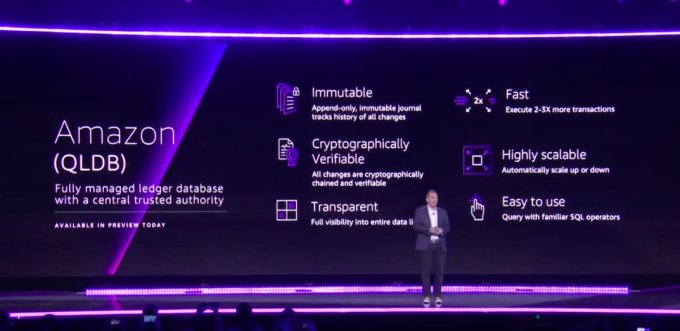Amazon last year dismissed the idea of getting into the blockchain with AWS, but today that’s changed. The company announced a new service called Amazon Quantum Ledger Database or QLDB, which is a fully managed ledger database with a central trusted authority. The service, which is launching into preview today, offers an append-only, immutable journal that tracks the history of all changes, Amazon said.
And all the changes are cryptographically chained and verifiable.
The company announced the product on stage today at AWS:ReInvent, noting QLDB’s other features – including its transparent nature, ability to automatically scale up or down as needed, ease of use, and speed. The database can execute two to three times more transactions, Amazon claimed, compared with existing products.

“It will be really scalable, you’ll have a much more flexible and robust set of APIs for you to make any kind of changes or adjustments to the ledger database,” said Andy Jassy, AWS CEO, in describing the new offering.
QLDB was only one of AWS’ blockchain-related announcements today. The company also debuted AWS Managed Blockchain, which can work with QLDB.
“Amazon Managed Blockchain is a fully managed service that allows you to set up and manage a scalable blockchain network with just a few clicks,” Amazon explained in an announcement. The product eliminates the overhead required to create the network and automatically scales to meet the demands of thousands of applications running millions of transactions, it said.
It also manages your certificates, lets you easily invite new members to join the network, and tracks operational metrics such as usage of compute, memory, and storage resources.
Managed Blockchain is able to replicate an immutable copy of your blockchain network activity into Amazon Quantum Ledger Database (QLDB), which lets you analyze the network activity outside the network and gain insights into trends.
from TechCrunch https://ift.tt/2P23gIN







0 comments:
Post a Comment